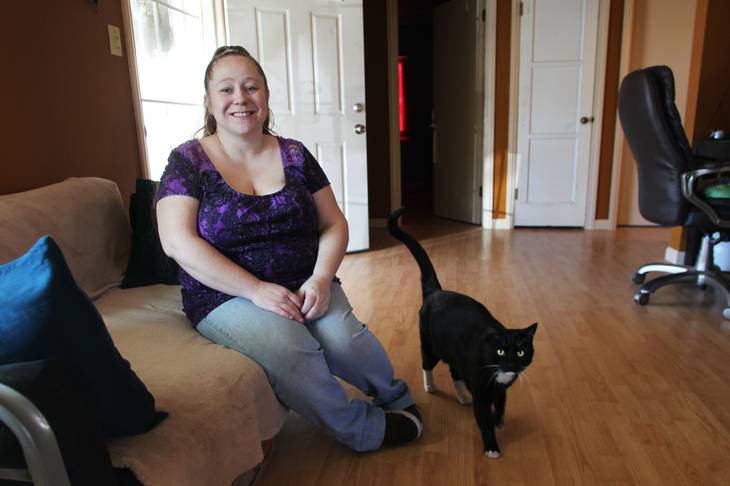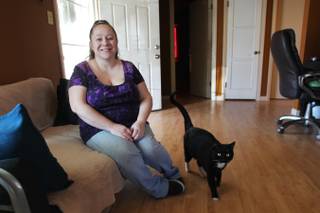VEGAS INC and Sun archives
Tobie Ortiz’s house doesn't seem like a hot property.
When she bought the bank-owned home last year, permanent-ink marker and puff paint marred the walls. Siding was damaged, door frames were broken and fence slats were missing. It looked like someone had jackhammered the floor of a utility closet.
Still, Ortiz faced stiff competition for the aging 1,000-square-foot Henderson house. She and her fiancé had to raise their offer twice, and they ended up paying $54,500, almost $3,000 above the listing price.
Their experience is not unique. Prices for bank-owned homes are rising in the Las Vegas Valley as cash investors gobble up inventory looking for good deals on cheap houses they can rent out for a profit.
Locals, on the other hand, typically need a mortgage loan and can’t beat investors’ offers, making it hard for people who want to buy a house to live in. Competition for limited inventory also has lowered the discount homeowners get, if any, when they buy a foreclosed house.
Ortiz learned about the local investor craze during her homebuying search. Initially, she figured they wanted former million-dollar houses now listed for a few hundred thousand.
“But that’s not the case,” she said. “They’re targeting the really low ones.”
In the valley, the median sales price of bank-owned single-family homes in December was $140,000. That's up 33.5 percent from $104,900 a year earlier, according to the Greater Las Vegas Association of Realtors.
Valley residents buying foreclosed homes, as opposed to non-distressed properties, received an average 16 percent discount in the three months ending Sept. 30. The discount for foreclosures nationally was 32 percent, according to RealtyTrac.
Investors typically do not buy homes simply because they're distressed, Las Vegas broker Krystal Sherry said. They use a financial formula to pursue deals that are favorable. Still, they expect a discount.
“They think they should get it for pennies on the dollar,” Sherry said. “But the market is changing.”
The lack of inventory has pushed up prices for any housing, distressed or otherwise.
More than 60 percent of Las Vegas homeowners with mortgages are underwater — meaning they owe more than their house is worth — and many of them refuse to sell for fear of booking steep losses. At the same time, Nevada’s robo-signing law, which took effect in October 2011, has crimped inventory by forcing banks to provide more paperwork before they foreclose on homes.
Banks reduce listing prices if homes don’t sell in 30 days, but that rarely happened last year, said Kolleen Kelley, GLVAR’s president in 2012.
“We just don’t have a lot out there to choose from,” she said.
Ortiz found that out firsthand. She and her family were renting a house off Greenway Road in Henderson when the landlord veered toward foreclosure. The renters didn’t know whether they’d come home one day to an eviction notice, so Ortiz, who has two children, and her fiancé, David Logan, decided to buy a place.
They wanted to stay in the older part of Henderson, east of U.S. 95 and south of the 215 Beltway. Last summer, they started looking for a four-bedroom in the $50,000 range.
Ortiz and Logan never applied for a mortgage loan, figuring they’d be rejected. They lost their jobs when the recession hit, and Ortiz has been in nursing school since. Logan was unemployed for three years before starting work a year ago as an independent contractor for Czarnowski, a convention services provider.
To afford a house, they liquidated their 401(k)s and gathered all the cash they could. They came up with $60,000.
With the help of their broker, Sherry, they found a 1,042-square-foot house for sale on Federal Street. Built in 1953, the single-story house has three bedrooms, one bathroom, a carport and was owned by Freddie Mac. The mortgage finance company foreclosed on it last March. Ortiz and Logan visited in early August and instantly liked the house.
It was in decent shape but needed a fair amount of work. Kids had drawn on the walls. The inside paint was grungy. Berries had been smeared on the ceiling of the master bedroom. A door frame had been kicked in. Exposed electrical wires were next to water pipes in the utility closet, which also had a big hole in the floor.
The lender wanted $64,000 as recently as July 19. When Ortiz and Logan saw the house, it was listed for $51,750.
They put in a bid the day after visiting. They soon learned there were four or five other bidders, most of whom also offered cash. At least one was an investor.
The couple twice upped their bid. Eventually, they got the house. The sale was recorded Sept. 18.
Lucky for them, Ortiz is the daughter of a general contractor and knows how to fix most things. She and family members already have sanded and painted the walls, replaced the baseboards and started renovating the kitchen. She’ll let an electrician handle the utility closet.
She and Logan spent everything they had on the house and now are rebuilding their savings. But the investment was well worth it to Ortiz, who rests easy knowing a bank can’t seize her home.
“There’s no beating it,” she said.

